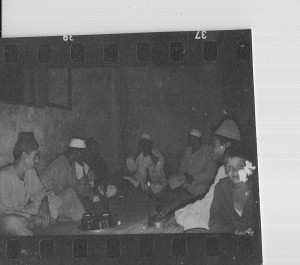I am interested in chess as a reader, not as a player. I was ever a sot for words and who can resist phrases like: ‘Nimzo-Indian Defence’, ‘Poisoned Pawn Variation’, ‘Queen’s Gambit’ (or better still ‘Queen’s Gambit Declined’)?
In 1980, when I went to live in a village in the Nile Delta (the ‘Lataifa’ of In An Antique Land),

I took several chess books and a small chess set with me. In Egypt, as in most Mediterranean countries, there is a great love of board games, especially backgammon and chess. Many of Lataifa’s fellaheen knew how to play chess. In the evenings, after the fields had been watered and the cows and buffaloes had returned to their middens, we would sometimes sit down to play. I would prepare elaborate openings, learned from my books (the Ruy Lopez, I remember was a particular favourite). But it was hopeless. My opponents would never do what the books said they would, which invariably flummoxed me. After suffering many humiliating losses it occurred to me at last that chess might be (at least for me) one of those things – like deep-sea-diving and kundalini yoga and politics – that was better read about than practiced.
Looking back now, I think my interest in chess must have been kindled by the Fischer-Spassky matches, which were held the year I graduated from school. The chess players of that period were deeply interesting people: Fischer of course, but also Spassky and Viktor Korchnoi and Tigran Petrossian. And then of course, a generation later, there was Garry Kasparov, who was not only the dominant figure in the sport, but also a fascinating and mercurial person, in the grand tradition.
I had never imagined that I would meet Kasparov, but so I did, in 2010. He is a deeply interesting man, as one might expect, absolutely fizzing with energy and ideas; what is unexpected about him is that he is also very charming, in an almost childlike way. He said many complimentary things about Vishwanathan Anand, but then suddenly, apropos nothing, he wagged a finger at me and declared: ‘Chess was not invented in India! It is a completely wrong idea. Completely wrong!’
I had the impression that this was a continuation of an argument with someone else (perhaps Vishwanathan Anand?). I was reminded of a story an uncle of mine used to tell. He had studied at Trinity College, Cambridge in the late 1940s and was very much in awe of Bertrand Russell who was then the presiding genius of the place. One day he found himself standing behind Russell in a queue (those were the days of post-war rationing). Suddenly Russell turned around and thrust his forefinger into my uncle’s chest. ‘India did not invent the zero!’ he announced. And then he walked away.
One of the most remarkable things about chess is that it lends itself wonderfully to story-telling, in literature and film. Nabokov’s The Luzhin Defence and Stefan Zweig’s The Royal Game, come at once to mind, as do Ingmar Bergman’s Seventh Seal and Satyajit Ray’s Shatranj ke Khilari (‘The Chess Players’) – one his finest works in my view: what a marvelous performance he coaxes out of Sanjeev Kumar!.
But it’s been a long time since I last saw a good chess movie. This is why it was doubly pleasing to chance upon Queen to Play (the original French title was Joueuse; dir. Caroline Bottaro). I had never heard of the movie and came it upon through a serendipitous click of the remote. It is not in the same league as The Seventh Seal and Shatranj ke Khilari, but it is still an engaging, enjoyable, heartwarming movie, about a hotel maid in Corsica who learns to play chess and goes on to win a tournament.
The only well-known actor in it is Kevin Kline and he hams it up in his usual good-natured way. But it is Sandrine Bonnaire, in the lead role, who transforms what could have been a pedestrian film into something very special. She is marvelous and deserves to be better known.
What a pity these small jewels never get the airing they deserve. Fortunately Queen to Play is available for live-streaming on Netflix. Highly recommended.

Chess is also a declining tradition in some ways.
My grandfather taught me how to play (and I would make him play without the Queen. He would still win!) and as a kid, I would play with my dad, my aunt, even the domestic help who we called ‘Pishi’ (I taught her to play, and then was never able to beat her).
Now, I don’t remember the last time I played, since I live away from home, and have no one to play with. The younger people (children of the 90s, and, brighter and more aware than we were as kids) mostly don’t know how to play. Their gaming expertise lies in the zone of Playstations and consoles (by no means, easier things to play or master). And obviously, chess does not lend itself interestingly to virtual gaming.
Your post on chess made me nostalgic. It’s an integral part of my growing up.
Another piece of brilliant chess writing was a report on the 1985 classic match between Garry Kasparov and Anatoli Karpov by the one and only Martin Amis. ‘Chess: Kasparov v. Karpov’ is in Amis’ book of articles, ‘Visiting Mrs Nabokov’. The writing rekindled in me a longing to play and understand the game– leading me to buy a Russian book on the moves the
grandmasters made in that match, and later a big wooden chessboard from Mussoorie. But I later realized that my enthusiasm was for the writing, not the game.